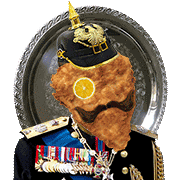|
What was the benefit of purchasing a commission in the British Army?
|
|
|
|

|
| # ? May 7, 2024 06:04 |
|
Ataxerxes posted:The Russian commander at https://en.wikipedia.org/wiki/Battle_of_Koljonvirta in 1808 was killed near the end of the battle, I have read some anecdotes saying that he was a prominent target on his horse and was sniped off it by Swedish field guns. https://en.wikipedia.org/wiki/Leonidas_Polk
|
|
|
|
Fangz posted:What was the benefit of purchasing a commission in the British Army? To get to be an officer in the British Army, or to get a promotion.
|
|
|
|
I think you could sell it when you left, so it was a way of getting a job with a cash payout on retirement. I don't know how it compared to just buying a bit of land and being a farmer, in financial terms, if you were a failson without any other job prospects. I know that lots of elite jobs in that period had these sort of arbitrary cash barriers. Like if you wanted to go be a barrister you had to have the money set aside to spend ten years living an inn of court twiddling your thumbs till you were given any paid work. And members of parliament had to haemorrhage money buying elections and getting no pay until they were important enough to get ministerial jobs.
|
|
|
|
Fangz posted:What was the benefit of purchasing a commission in the British Army? There wasn’t necessarily much material benefit for the commissioned officer himself, but it was a good way for fathers of the landed gentry to give their younger sons something to do. The eldest son stood to inherit, but the younger sons usually became officers in the army or Navy or became priests in the Church of England. It was a respectable thing for men to do, and better to buy them a commission for £200 than give them them £200 to gamble and whore away (let them do that with their pay). It also became a small social stepping stone for the sons of city merchants etc to gain some respectability and status. E: pay for a captain in a line regiment during the Napolonic wars was about £200/yr. It was 50% more for cavalry officers (who may have been required to provide their own horse?); I know cavalry regiments were always much more fashionable than infantry and keeping up appearances in one was more expensive . A RN Captain of a frigate was paid more like a cavalry officer, and also had the potential for prize money. An Able Seaman's pay was £20/yr, in a time when a decent tradesman (joiner, mechanic, etc) might make £40-80/yr. An officer's pay was reasonably comfortable, but they weren't getting rich on their pay. Kaiser Schnitzel fucked around with this message at 00:11 on Apr 22, 2020 |
|
|
|
Was there any long-term profitability associated with having served in as an officer? Any greater opportunities or political advantages? Not that I doubt that glory from army service had real non-monetary value, just often non-monetary value tends to form connections with monetary value. Cessna posted:Let's not forget that individual liberty - especially freedom of speech and freedom of the press - went right out the window in the pre-war South. Private mail was searched by postal officials to check for pro-abolitionist literature, newspaper editors were threatened and terrorized by both the public and law enforcement if they spoke against slavery, etc. "States' Rights" was always a peculiar little specification to leave out federal rights or individual rights. Gotta make sure to keep local power structures intact at any cost. Modern people who ascribe to that concept tend to try arguing "property rights" in order to emphasize the wealthy and corporations over all else. Which of course, is also the major basis for socialism/communism/anarchism declaring to abolish all private property.
|
|
|
|
SlothfulCobra posted:Was there any long-term profitability associated with having served in as an officer? Any greater opportunities or political advantages? Higher ranks like Colonels/generals/admirals did get paid a pretty nice salary. IIRC, once you became one, you were basically guaranteed half pay for the rest of your life. If it wasn't a vast fortune, it was at least stability.
|
|
|
chitoryu12 posted:So the problem with Osprey is that if you have stuff in your cart and then try to switch stores, it'll just break instead of doing a currency conversion. Clear your cookies and log into the UK store, then delete everything from your cart before switching to the US store and putting them back. Thanks.  coupon, but at least I know what the problem was now. coupon, but at least I know what the problem was now.
|
|
|
|
|
Kaiser Schnitzel posted:I'm not so sure about the army, but in the navy the draw of prize money was real and substantial. A captain who captured a lawful prize would receive IIRC 3/8 of the total value of the cargo and vessel, which could be thousands and thousands of pounds or more. Even the share for an ordinary seaman might be several years pay, and capturing a rare homeward-bound Indiaman or galleon could easily set captain and crew up for life. The value of a prize was divided between the number of vessels within sight of the prize when it was captured, and then each ship's prize allotment was split into eighths. Captains (as in the postion, not the rank - the commanding officer of the ship, in other words) received three-eights, although if the captain was sailing under flag officer orders the flag officer gained one of those shares. This is why a flag officer position in a valuable and prize-rich area such as the West Indies or the Cape of Good Hope was a valuable and desirable posting - you could sit ashore at Admiralty House and have your captains rake in prize money for you! In his four years as commander-in-chief on the Jamaica Station, Rear-Admiral Hyde Parker is supposed to have netted about £200,000 in prize money...in 1790s currency! One of Parker's most lucrative favourite captains was Pigot of the Hermione, better known for being a sadist who was murdered by his own crew in 1797. Conversely, it's why independent cruises under Admiralty orders were sought after by captains, since the captain would get their full three-eighths and, if the ship was sailing alone, the full prize value went to the ship's company. A prize taken within sight of a squadron or fleet could have its prize value split a dozen ways, with the flag officer taking one of each captain's eighths. Of the five shares remaining, one was distributed amongst the commissioned officers and senior warrant officers, another was split amongst the junior warrant officers, master's mates and chaplain and a third was divided between the midshipmen, petty officers and marine NCOs. This left two-eighths to be split amongst the rest of the crew - by now basically only the able and ordinary seamen and landsmen. As you can see a large ship would end up sharing prize money many more ways than a small one, which is another reason why frigates were fairly desirable postings. As an example, take the distribution of prize money from the captured Spanish frigates Santa Brigida and Thetis, captured by four British frigates in the Bay of Biscay after a long chase. Both proved to laden with gold and silver - enough to need something like 65 wagons to unload it all at Plymouth. Despite the total haul being split four ways, each captain received (in the currency of 1799), £40,000, each lieutenant received £5,000 and each warrant officer around £2000. Ordinary seamen received around £185 each. This is at a time when it cost the East India Company about £15,000 to build and fit out a complete Indiaman. A frigate captain's normal annual pay was about £300, a lieutenant's about £100, a warrant officer about £50-75 and an ordinary seaman would be on about £15. So a really good prize haul would give a sailor a windfall of approximately 12 years' pay, and a captain's the equivalent of a career lasting over a century! Even a more normal prize capture, such as a laden merchantman or a useable enemy frigate, which might fetch £10,000 at the prize court, would yield the lucky captain the equivalent of a decade's worth of pay, even with his admiral taking an eighth. A sailor on the lower deck would get near-enough the equivalent of a year's pay for what might have been an hour or two's work.
|
|
|
|
I've read that prize money (particularly from privateers) devastated several local economies during the Revolution, because the drunken sailors had a habit of spending their money like drunken sailors and it was a huge amount of cash injected directly into a small economy. Did Britain's major ports have such effects, or were they large enough to avoid it.
|
|
|
|
|
Gnoman posted:I've read that prize money (particularly from privateers) devastated several local economies during the Revolution, because the drunken sailors had a habit of spending their money like drunken sailors and it was a huge amount of cash injected directly into a small economy. Did Britain's major ports have such effects, or were they large enough to avoid it. I don't know, most sailors got paid off in lump sums, for instance at the end of a long voyage, or when the crew of a whaler made it back to port with several hundred barrels of oil. In whaling and fishing, like prize money, sailors got paid in shares, so you could say that most seaports (American or English) were economically designed to get that cash out of the sailors hands as fast as possible between voyages. If you read the biography of Ned Myers, a guy who spent his entire life before the mast in navies or the merchant marine, you see this quite dramatically. It was a bigger problem when peace broke out for several years, or when most of the Royal Navy was stuck on blockade duty without significant action during the latter Napoleonic Wars.
|
|
|
|
Thanks all for those answers regarding Confederate rank and file motivations.
|
|
|
khamul posted:Artillery fire was way more effectively used against masses of infantry or horse. Field artillery especially had to be careful not to shoot off all its ammunition, because once the trail boxes and caissons were empty they had to either pull out or send for the ammunition train. Still, there are plenty of stories of artillerymen picking out individual targets, even officers on horseback for special attention. There is one story about Colonel Winfield Scott, at Chippewa in 1814, using his sword to check the flight of a roundshot. When it didn't edge away to one side or the other of the blade, he spurred his horse and dodged it. There's another story of a militia soldier during a siege in the same war, who was standing on a rise of ground to warn others where shells were landing. He was killed when he couldn't figure out that a projectile that was standing still in the sky was heading straight at him... There was also Leonidas Polk, the bishop and West Point graduate who was made a Confederate major general. He wasn't particularly good at battle despite his personal popularity with the troops, and he met his end when he, William J. Hardee, and Joseph E. Johnston all brought their staffs to scout out Sherman's positions near Marietta. They all decided to stand in an exposed area where Sherman easily spotted them. Presumably after openly wondering what the gently caress these guys were doing, Sherman ordered his guns to fire on them, and Polk actually refused to run when the first shots came. On the third volley, Polk was cut almost completely in half by a shell.
|
|
|
|
|
Back in the day a wargame company called Yaquinto Games made a game called Battles & Leaders which covered the US Civil War. It was okay, but the best part was the table you rolled on whenever a leader got hit (2 d6es):/pic1239617.jpg) Clearly Polk rolled a 16.
|
|
|
|
Cessna posted:Back in the day a wargame company called Yaquinto Games made a game called Battles & Leaders which covered the US Civil War. It was okay, but the best part was the table you rolled on whenever a leader got hit (2 d6es): 61 is kind of alarming. ...I don't suppose you can tell us what (K) (0) (+1) etc means?
|
|
|
|
Tree Bucket posted:...I don't suppose you can tell us what (K) (0) (+1) etc means? The image itself contains an explanation at the start of the table.
|
|
|
|
Anshu posted:The image itself contains an explanation at the start of the table. Oops. I guess this counts as a (NW) (-2) (*)
|
|
|
khamul posted:I don't know, most sailors got paid off in lump sums, for instance at the end of a long voyage, or when the crew of a whaler made it back to port with several hundred barrels of oil. In whaling and fishing, like prize money, sailors got paid in shares, so you could say that most seaports (American or English) were economically designed to get that cash out of the sailors hands as fast as possible between voyages. If you read the biography of Ned Myers, a guy who spent his entire life before the mast in navies or the merchant marine, you see this quite dramatically. It was a bigger problem when peace broke out for several years, or when most of the Royal Navy was stuck on blockade duty without significant action during the latter Napoleonic Wars. That would make sense. A lot of the stories I was hearing were from smaller towns in New England that decided to back a single privateer (letters of marque were extremely expensive), rather than long established major ports.
|
|
|
|
|
Mr Enderby posted:I think you could sell it when you left, so it was a way of getting a job with a cash payout on retirement. It's worth noting that while of course this was all about entrenching the aristocracy and upper middle classes in their place in the top rungs of society, contemporary this was a system that everyone saw as a way of getting the upper classes to run the state and pay for the privilege.
|
|
|
|
Alchenar posted:It's worth noting that while of course this was all about entrenching the aristocracy and upper middle classes in their place in the top rungs of society, contemporary this was a system that everyone saw as a way of getting the upper classes to run the state and pay for the privilege. Also, you really want the people running your Army to be those who have a stake in the current system lest the proles get uppity ideas. Which might be why the Navy didn't go for it. You can't occupy feedmegin fucked around with this message at 11:11 on Apr 22, 2020 |
|
|
|
Mr Enderby posted:I think you could sell it when you left, so it was a way of getting a job with a cash payout on retirement. Officer's salary wasn't enough to maintain the lifestyle that officers were supposed to uphold, so if you didn't get money from home, you would be a social outcast with few hopes for promotion. Unless you succeeded looting something expensive and didn't spend it all at once on    Kaiser Schnitzel posted:There wasn’t necessarily much material benefit for the commissioned officer himself, but it was a good way for fathers of the landed gentry to give their younger sons something to do. The eldest son stood to inherit, but the younger sons usually became officers in the army or Navy or became priests in the Church of England. It was a respectable thing for men to do, and better to buy them a commission for £200 than give them them £200 to gamble and whore away (let them do that with their pay). It also became a small social stepping stone for the sons of city merchants etc to gain some respectability and status. I've understood that officers had to pay for all of their equipment, horses included. And infantry and artillery officers also had horses. Enlisted didn't have to pay for their weapons (unless they lost them), but might have had to buy their own uniforms, not 100% sure about that.
|
|
|
|
Please tell me artillery officers didn't have to pay for their own artillery.
|
|
|
|
The Lone Badger posted:Please tell me artillery officers didn't have to pay for their own artillery. They did at first, but they kept showing up with all this custom tacticool poo poo that was a nightmare in the field. (Think I've gotten from Hornblower or somewhere, that RN captains supplemented additional powder and shot for training out of their own pocket. I addition to paints and crew uniforms and stuff rich captains spent money on. Anyone know anything about that?)
|
|
|
|
The Lone Badger posted:Please tell me artillery officers didn't have to pay for their own artillery. A generation earlier in like the 17th c. the Colonel of the regiment did in fact raise and equip the regiment and it operated much more like a mercenary company. Regiments in the British army were known by their colonel's name ('Hepburn's Regiment' or 'Lord Wentworth's Regiment') until all regiments were numbered in 1751. E: Xakura posted:(Think I've gotten from Hornblower or somewhere, that RN captains supplemented additional powder and shot for training out of their own pocket. I addition to paints and crew uniforms and stuff rich captains spent money on. Anyone know anything about that?) Kaiser Schnitzel fucked around with this message at 13:05 on Apr 22, 2020 |
|
|
|
feedmegin posted:Also, you really want the people running your Army to be those who have a stake in the current system lest the proles get uppity ideas. You've got it backwards. It's the Royal Navy, and the Royal Air Force, but just the plain old Army. There's a reason for that. The Navy promoted via merit, but that just meant that being a member of the gentry wasn't sufficient to guarantee you success. It was still pretty necessary to getting your foot on the first few rungs on the ladder, and whether or not you would be picked out of 'merit' depended a lot on patronage.
|
|
|
|
Note that you don't have to have any actual money to be an officer, just credit. 
|
|
|
|
Kaiser Schnitzel posted:There wasn’t necessarily much material benefit for the commissioned officer himself, but it was a good way for fathers of the landed gentry to give their younger sons something to do. The eldest son stood to inherit, but the younger sons usually became officers in the army or Navy or became priests in the Church of England. Oh, yeah that was another job you had to buy your way into. The right to propose a candidate for a cure of souls could be bought and sold. Technically the bishop had the option of refusing a candidate, but that was basically a technicalities. It was entirely acceptable for your father to buy the advowson of a juicy parish with an elderly parson, so that when the incumbent died he could hand you the position. These benefices could come with huge incomes in the form of tithes. Clergy without money had to try and find wealthy patron, or resign themselves to living a curate (basically doing the exact same job as a vicar or rector, but for a tiny stipend, while the tithes went into the hands of clergyman or a lay landownder). Edit: Fun side note. You couldn't sell the advowson while the position was vacant, but the advowson was more valuable the sooner it was likely to come open (i.e. the closer to death the incumbent was). This meant lay patrons who wanted to cash out of their advowson at the highest possible value sometimes deliberately selected ancient and infirm clergymen. Mr Enderby fucked around with this message at 13:27 on Apr 22, 2020 |
|
|
|
Siivola posted:Note that you don't have to have any actual money to be an officer, just credit.
|
|
|
|
Weka posted:I know next to nothing about the American civil war so go easy on me ... Others have already answered the conscription question; I just wanted to add that the Twenty Negro Law is one of the most amusing/tragic examples I'm aware of where one group of people start a fight and then very deliberately send others to do the actual fighting. The planter class bore almost all of the responsibility for starting the war in the first place (and I'd argue that the biggest theme of the war itself was breaking their stranglehold on American politics and the economy) but when it came time to actually do something about it they couldn't be bothered to leave the plantation. As for what motivated Confederate soldiers, this is a thing that is so polluted by decades of propaganda history and modern politics it is hard to even discuss rationally. Anyway, what you're really asking is what were the political motivations; all those guys had the standard variety of more practical things going on (money/adventure/food/peer pressure/boredom/etc etc). As far as politics/patriotism go, there were three very distinct phases of the war for the southern soldier, especially in the east: before the Emancipation Proclamation, between the EP and the Battle of Atlanta/1864 Election, and after the 1864 Election. You can clearly see soldiers' motivations changing and evolving as the war went on, which is one of the things that makes answering this question very difficult. Early in the war, the entire enterprise was very much sold as a Second American Revolution, itself stemming from a fundamental disagreement about the nature of the Constitution. Fundamental rights were being trampled, our way of life is under threat and so on. Mixed in with this was the feeling there was a very direct threat to their homes and families. Southern politicians leveraged all of this into propaganda, telling soldiers they were fighting for freedom and way of life and all that in a way very familiar to us today. The average soldier of course didn't know much about the nuances of national politics and the changing demographics and the years of failed negotiations between north and south, but they -- like all of us -- felt a loyalty to the home team. Now, if one drills into this narrative a bit: ("What rights?" "Property rights!" What property? Plantation capital equipment! What...equipment? ...slaves.) the obvious hypocrisy reveals itself. Remember, however, that the United States was also founded on this exact same form of hypocrisy, so this wasn't exactly seen as a dealbreaker. In fact, they probably didn't even see it as hypocritical. The Emancipation Proclamation changed a whole lot about how the south saw the war. It shifted the northern cause away from simple reunification, and made it clear that any future United States wouldn't include chattel slavery. This had some effect on themes in Union armies, but it dramatically changed how southern soldiers saw things. This was now an unambiguous attack on the great pillar of the southern economy (slavery); more importantly to the common soldier, there was now an implicit declaration that black people were NOT categorically inferior to whites. Remember, they'd been raised in a society that didn't just practice white supremacy...its social structure and economy was built on it. While the average southern soldier probably didn't really care that much about the nuances of slavery politics, he certainly did care about NOT being on the bottom rung of society. Plus, there was a good chance that, even though he probably didn't own slaves personally, that his job/livelihood back home involved slavery somehow. Thus, the narrative changed from this idea of freedom/independence, to something more insidious: we're defending our state, our homes, our families from a huge invading Yankee army...and we're protecting our right to build a racist and stratified society that practices chattel slavery along with it. After the 1864 election, the die was more or less cast for the remainder of the war, and the incompetency of the CSA government had worn very seriously thin. The guys who were still left felt very little loyalty to any government or any particular political agenda; at that point they were mostly there out of loyalty to their army/commander/unit, and that weird desire we sometimes have to see things through. There was kind of a latent fear of northerners/blacks/uncertainty still present -- one that was exacerbated by the tens of thousands of black soldiers that were filling out Union ranks -- but it was pretty clear by that point that there wasn't anything of the CSA left saving.
|
|
|
|
bewbies posted:Others have already answered the conscription question; I just wanted to add that the Twenty Negro Law is one of the most amusing/tragic examples I'm aware of where one group of people start a fight and then very deliberately send others to do the actual fighting. The planter class bore almost all of the responsibility for starting the war in the first place (and I'd argue that the biggest theme of the war itself was breaking their stranglehold on American politics and the economy) but when it came time to actually do something about it they couldn't be bothered to leave the plantation. the confederates had this general named patrick cleburne, who immigrated from ireland some decades before and was an enthusiastic adopter of the confederate cause. he was really feeling this whole "gently caress the government" angle to the secession from the union, and was not as personally connected to the whole "keep slavery" thing anyway, just before he was shot to poo poo at franklin with a bunch of other confederate generals in some dumb death-or-glory moment, he pitched to an entire room of his peers the idea that "hey, we're losing this war real badly for lack of troops, so why don't we free the slaves and arm them so they fight for their nation like men?" as i'm sure most of you do, i often think about going back in time and witnessing world events, and to be a fly on the wall during this conversation is one of my more frequent idle fantasies
|
|
|
|
Slavery was still a major motivation in the early war and a fair number of those early volunteers were vocal about that. Slavery was THE political issue of the 1850s and it really can’t be minimized how much people were invested in it even if they didn’t own them. A lot gets made, for example, of small farmers getting dragged into the big slave owners’ war but those small farmers were intimately intertwined in the slavery economy and benefitted from it. For example they frequently sold crops to the larger plantations. They also frequently rented slave labor to bring in their own crops, as planting and harvesting seasons differ enough between the big cash crops and food crops. There is also a bit of aspirational support for the institution. If you were a medium-small farmer (not just growing did subsistence and selling surplus but growing specifically for the market) of the type who frequently rented slave labor then buying a few slaves of your own was a way to really bootstrap your business and grow it quickly. It should also be remembered that the south wasn’t monolithic in support for either slavery or secession and a lot of those people were violently repressed. West Virginia’s origin story is the most famous but you also see a pretty serious insurgency in rural Arkansas that iirc sent a fair number of people north to fight in the union.
|
|
|
|
It says something both about the government and culture in the south that many states felt it necessary to criminalise the promotion of abolition in the south.
|
|
|
|
I do think it’s important to emphasize that secession want uncontroversial down there, especially in states that weren’t South Carolina. There is a post war (and I think early 20th C to be honest) myth about the unity of the southern cause that tries to turn it into a much more black and white issue.
|
|
|
|
Alchenar posted:It says something both about the government and culture in the south that many states felt it necessary to criminalise the promotion of abolition in the south. This goes into the Jim Crow era as well. The law was not often "your business is allowed not to serve black people" but "your business is not allowed to serve black people".
|
|
|
|
Cyrano4747 posted:Slavery was still a major motivation in the early war and a fair number of those early volunteers were vocal about that. Slavery was THE political issue of the 1850s and it really can’t be minimized how much people were invested in it even if they didn’t own them. Even in the deeper south, there were areas with poor land that had never really become plantation-ized. Winston county in N. Alabama sort of unofficially' seceeded' from Alabama as the 'free state of Winston' that claimed to be neutral in the conflict. N. Alabama raised the 1st Alabama Cavalry for the union. N. Alabama follows the general Appalachian trend, but even in SE Mississippi, Jones County was only 12% black in 1860 and got so sick of the CSA government they started an armed insurgency against the confederacy, and I don't think that's the only place that happened.
|
|
|
|
Cessna posted:Back in the day a wargame company called Yaquinto Games made a game called Battles & Leaders which covered the US Civil War. It was okay, but the best part was the table you rolled on whenever a leader got hit (2 d6es): I think 31 and 56 are my favorites.
|
|
|
|
luxury handset posted:the confederates had this general named patrick cleburne, who immigrated from ireland some decades before and was an enthusiastic adopter of the confederate cause. he was really feeling this whole "gently caress the government" angle to the secession from the union, and was not as personally connected to the whole "keep slavery" thing For sure, would have been interesting to hear what General States Rights Gist thought about that idea.
|
|
|
|
luxury handset posted:anyway, just before he was shot to poo poo at franklin with a bunch of other confederate generals in some dumb death-or-glory moment, he pitched to an entire room of his peers the idea that "hey, we're losing this war real badly for lack of troops, so why don't we free the slaves and arm them so they fight for their nation like men?" Because you now have a whole bunch of well armed black men who are probably not fans of yours and are very keen on your losing this war. I don't think that would have gone well for them.
|
|
|
|
In one of the Flashman books (probably At the Charge or Great Game) he talks about the first report on the Crimean War being sharply and accurately critical and this necessitating a second report which said otherwise. Did this happen and is there anywhere to read these two reports online?
|
|
|
|

|
| # ? May 7, 2024 06:04 |
|
Alchenar posted:You've got it backwards. It's the Royal Navy, and the Royal Air Force, but just the plain old Army. There's a reason for that. Well yes, because of 'Also, you really want the people running your Army to be those who have a stake in the current system lest the proles get uppity ideas.' That sort of broke down in the mid 17th century for a bit. Mind you, despite naming its regiments after their officers, the New Model was centrally raised and supplied; that's more of a handy naming convention than a literal indication of ownership depending on the period. Also mind you at the start of the American Civil War you do have Confederate rich types raising their own military forces, to include Legions which had infantry, cavalry and artillery, all of it indeed privately financed. As is usual in a civil war they kind of eventually all got homogenised and merged into the more 'regular' organisation and chain of command.
|
|
|












































